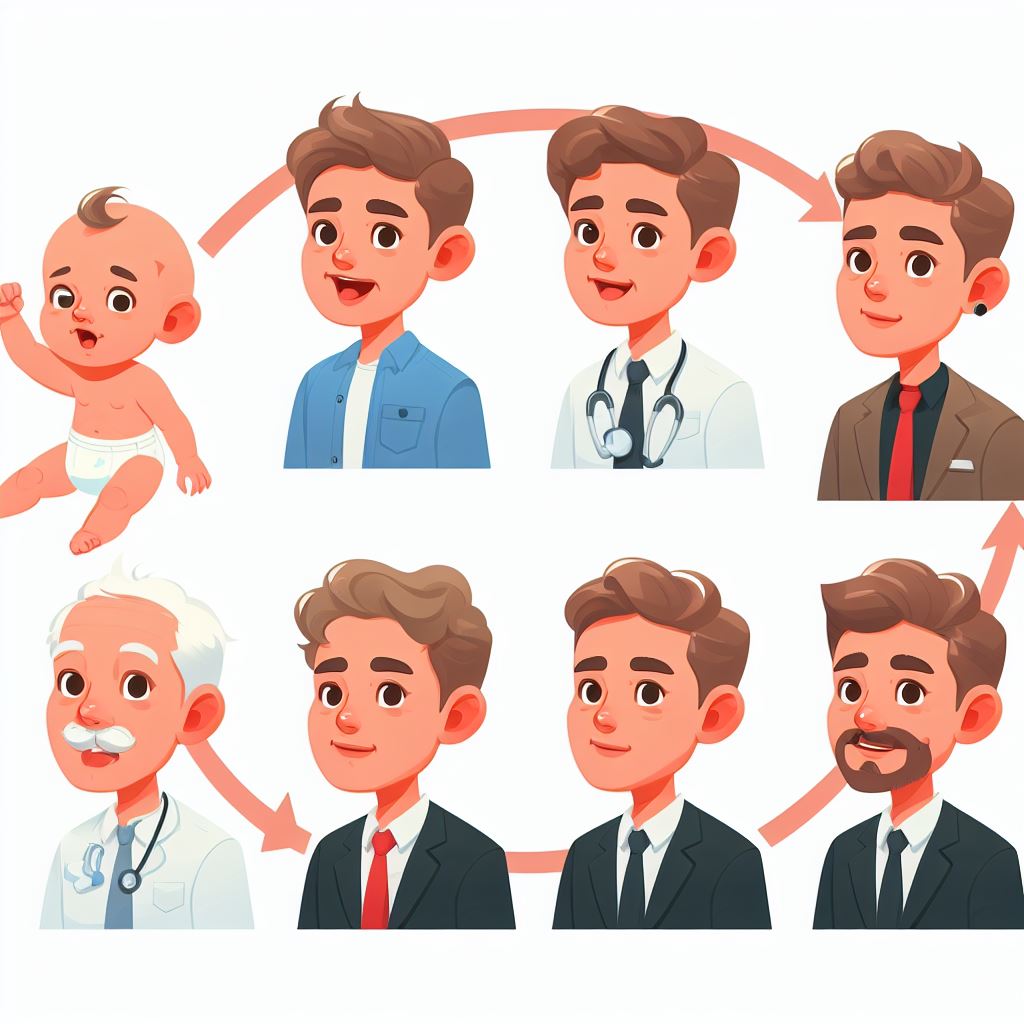Life is a beautiful journey filled with various stages and phases that shape our experiences and contribute to personal growth.
We explore the seven phases of life, from infancy to the golden years, and delve into the significance of each phase.
Understanding these phases can help us appreciate the unique challenges and opportunities that arise during different periods of our lives.
The Phases of Life: A Journey of Growth and Change
The phases of life are the different stages we go through from birth to death. Our lives follow a somewhat predictable pattern as we grow and develop. While the exact ages may vary slightly from person to person, humans generally experience seven key life phases.
FAQs
What are the symptoms of phase of life problems?
What is the meaning of new phase of life?
Why do people go through phases in life?
Quick Links
Phase 1: Infancy (Birth to 2 years)
Infancy is a time of rapid growth and development. During this phase, babies rely on their caregivers for all their needs and begin to explore the world around them. Infants develop essential skills such as crawling, walking, and speech. Early childhood experiences play a crucial role in shaping their future development. Parents and caregivers can support infants’ growth by providing a nurturing and stimulating environment, engaging in age-appropriate activities, and ensuring their physical and emotional needs are met.
Phase 2: Childhood (3 years to 12 years)
Childhood is a magical phase of life characterized by curiosity, imagination, and play. Children actively engage with the world, forming friendships, and discovering their passions. Education and socialization play vital roles during this phase, fostering cognitive, emotional, and social development. Encouraging children’s creativity, providing opportunities for exploration and learning, and nurturing their self-confidence are key aspects of supporting their growth during this phase.
Phase 3: Adolescence (13 years to 19 years)
Adolescence marks a significant transition from childhood to adulthood. It is a period of physical, emotional, and cognitive changes as the individual experiences puberty. Adolescents undergo identity formation, seeking independence, and forging their own path. This phase presents unique challenges for both teenagers and their parents or caregivers. Understanding the development taking place, maintaining open lines of communication, and providing guidance and support can help navigate this transformative phase successfully.
Phase 4: Early Adulthood (20 years to 29 years)
Early adulthood is a time of exploration and self-discovery. Individuals enter the workforce, pursue higher education, and establish themselves in society. This phase is filled with new beginnings, relationships, and a sense of independence. Making career choices, building meaningful connections, and embracing personal growth are pivotal during this period. It is a time to set goals, take risks, and lay the foundation for the future.
Phase 5: Middle Adulthood (30 years to 59 years)
Midlife is characterized by stability, personal growth, and family commitments. Individuals typically find career stability, raise families, and take on increased responsibilities. Balancing personal and professional life becomes crucial during this phase. Taking care of one’s mental and physical health and nurturing relationships are essential. Middle adulthood offers an opportunity to reflect on accomplishments, set new goals, and contribute to the community.
Phase 6: Late Adulthood (60 years to 79 years)
Retirement from work often marks the beginning of late adulthood, a phase where priorities may shift. This period is often a time of reflection, celebrating achievements, and embracing wisdom gained from life experiences. Maintaining social connections and staying active are important to ensure overall well-being. Late adulthood offers an opportunity to pursue hobbies, travel, and enjoy quality time with loved ones.
Phase 7: The Golden Years (80+ years)
The golden years of life are a time to cherish. While physical limitations and health challenges may arise, there is still much to appreciate and enjoy. This phase is about living a fulfilling life, focusing on the present, and accepting the changes that come with aging. The wisdom gained throughout the journey can be used to guide others and leave a lasting legacy. It is a time to embrace gratitude, cultivate inner peace, and find joy in simple pleasures.
Life is a complex journey full of peaks and valleys, and at times, we all find ourselves grappling with phase-of-life problems. This feature aims to shed light on common phase-of-life problems faced by individuals, discuss their potential causes, and empower readers with strategies to overcome these challenges and thrive.
Navigating Life’s Challenges? Subscribe to Our Newsletter for Support and Solutions.
Stay Updated with Expert Advice and Insights on Overcoming Phase of Life Problems.
Identifying Phase-of-Life Problems
Understanding the concept of phase-of-life problems and their prevalence among people from all walks of life is essential in addressing these challenges head-on. Whether it’s going through a career transition, experiencing relationship hardships, navigating major life milestones, or facing existential crises, these issues often arise as we navigate different stages in life.
“Life is a series of natural and spontaneous changes. Don’t resist them; that only creates sorrow. Let reality be reality. Let things flow naturally forward in whatever way they like.” –
Lao Tzu
It is crucial to develop self-reflection and awareness to recognize when one is facing a phase-of-life problem. Taking the time to pause, assess, and acknowledge the challenges we’re going through can be the first step towards finding solutions and creating positive change.
Can we help you with anything else?
Causes and Impact of Phase-of-Life Problems
Phase-of-life problems can be influenced by a variety of factors, including societal, cultural, and economic aspects. Society places certain expectations on individuals at different stages of life, which can create pressure and contribute to the emergence of these challenges. Likewise, cultural norms and values can play a significant role in shaping an individual’s experience of these life transitions.
The psychological and emotional impact of phase-of-life problems can be profound. They can lead to feelings of stress, anxiety, or even depression. By understanding the causes and impact of these challenges, we can begin to develop strategies and coping mechanisms to address them effectively. It is important to note that seeking professional help and support from loved ones can greatly assist in overcoming these difficulties.
Strategies to Overcome Phase-of-Life Problems
Adopting a growth mindset is crucial in overcoming phase-of-life problems. By reframing these challenges as opportunities for personal growth, resilience, and development, we can transform our perspective on these difficulties. Below are some strategies to help navigate phase-of-life problems:
- Self-reflection: Taking time for introspection and self-reflection can provide clarity amidst the chaos. Engaging in activities such as journaling, meditation, or therapy can help gain a deeper understanding of oneself and the challenges being faced.
- Mindfulness: Practicing mindfulness and being present in the current moment can alleviate stress and anxiety. Mindfulness techniques, such as deep breathing exercises or guided imagery, can be incredibly helpful in moments of uncertainty or doubt.
- Realistic expectations: Setting realistic expectations and acknowledging that life is a journey filled with ups and downs can help alleviate unnecessary pressure. Comparing oneself to others or societal standards often leads to feelings of inadequacy. Embracing one’s unique path and progress is key.
- Seeking support: It is crucial not to face phase-of-life problems alone. Seeking support from friends, family, or professionals can provide guidance, encouragement, and a fresh perspective. Opening up to trusted individuals can help in finding practical solutions to overcome these challenges.

Case Studies of Success
Success stories of individuals who have triumphed over phase-of-life problems can serve as a source of inspiration and motivation. These individuals have taken their challenges and turned them into opportunities for growth and self-fulfillment. By sharing their experiences, we can learn valuable lessons and garner hope for our own journeys.
Whether it’s someone who completely changed their career path to pursue their passions or a person who mended broken relationships and found greater happiness, these stories illustrate the power of resilience and determination in overcoming phase-of-life problems.
Coping with Phase of life Problems
Phase-of-life problems are a natural part of the human experience, and we all face them at various points in our lives. By identifying these challenges, understanding their causes and impact, adopting strategies to overcome them, and seeking inspiration from success stories, we can navigate these difficult periods and ultimately thrive.
Remember, it’s essential to approach phase-of-life problems with resilience, self-reflection, and a growth mindset. With the right mindset and support systems in place, we can transform these challenges into catalysts for personal growth and ultimately create a more fulfilling and purpose-driven life.











